The mobile app development industry is rapidly expanding, driven by a growing demand for innovative and efficient mobile applications. These tools streamline the development process and enhance the efficiency and effectiveness of mobile app creation. With the right mobile app development tools, developers can deliver high-quality mobile applications that meet users' needs.
Aloa, an expert in software outsourcing, recognizes the essential role of mobile app developer tools in the success of app development projects. With a deep understanding of the industry's demands, Aloa commits to providing developers with the necessary resources to excel. Our expertise is instrumental in navigating the complexities of mobile app development, ensuring projects are completed with precision and excellence.
Based on our comprehensive analysis and extensive research, we've compiled this guide that explores the essential mobile app development tools. This guide encompasses a comprehensive overview of mobile app developer tools and frameworks tailored for developers across all skill levels. Afterward, you'll gain a deep insight into the industry's leading tools, empowering you to choose the most suitable resources for your projects.
Let's get started!
What are Mobile App Development Tools and Software?
Mobile app development tools and software are the foundation for crafting smooth and creative apps on iOS and Android platforms. They offer developers the necessary frameworks, libraries, and environments for efficient app building, testing, and deployment. Mobile app development utilities address various requirements, from designing to coding, providing experts with a complete set of tools.
Our exploration highlights the importance of development environments and debugging tools. These elements are crucial for developers to effectively construct, examine, and polish apps, guaranteeing they adhere to the rigorous demands of the contemporary mobile app market.
21 Best Mobile App Development Tools and Software
In mobile app development, selecting the optimal tools can significantly impact the success of a project. These mobile app development tools empower developers to streamline workflows, enhance productivity, and deliver exceptional user experiences. Understanding the functionalities of diverse mobile app developer tools can increase productivity and streamline workflow.
Here, we highlight top mobile app developer tools, including frameworks and software, that stand out in 2024. These tools cater to a broad spectrum of needs, from design to deployment, ensuring efficiency and innovation in mobile app creation.
Android App Development Tools
Android app development tools are essential resources for developers creating applications for Android. These mobile app development tools offer a range of features to streamline the development process, empowering developers to create high-quality applications efficiently.
Here, we'll explore the top Android app development tools to aid developers in their endeavors.
1. Android Studio
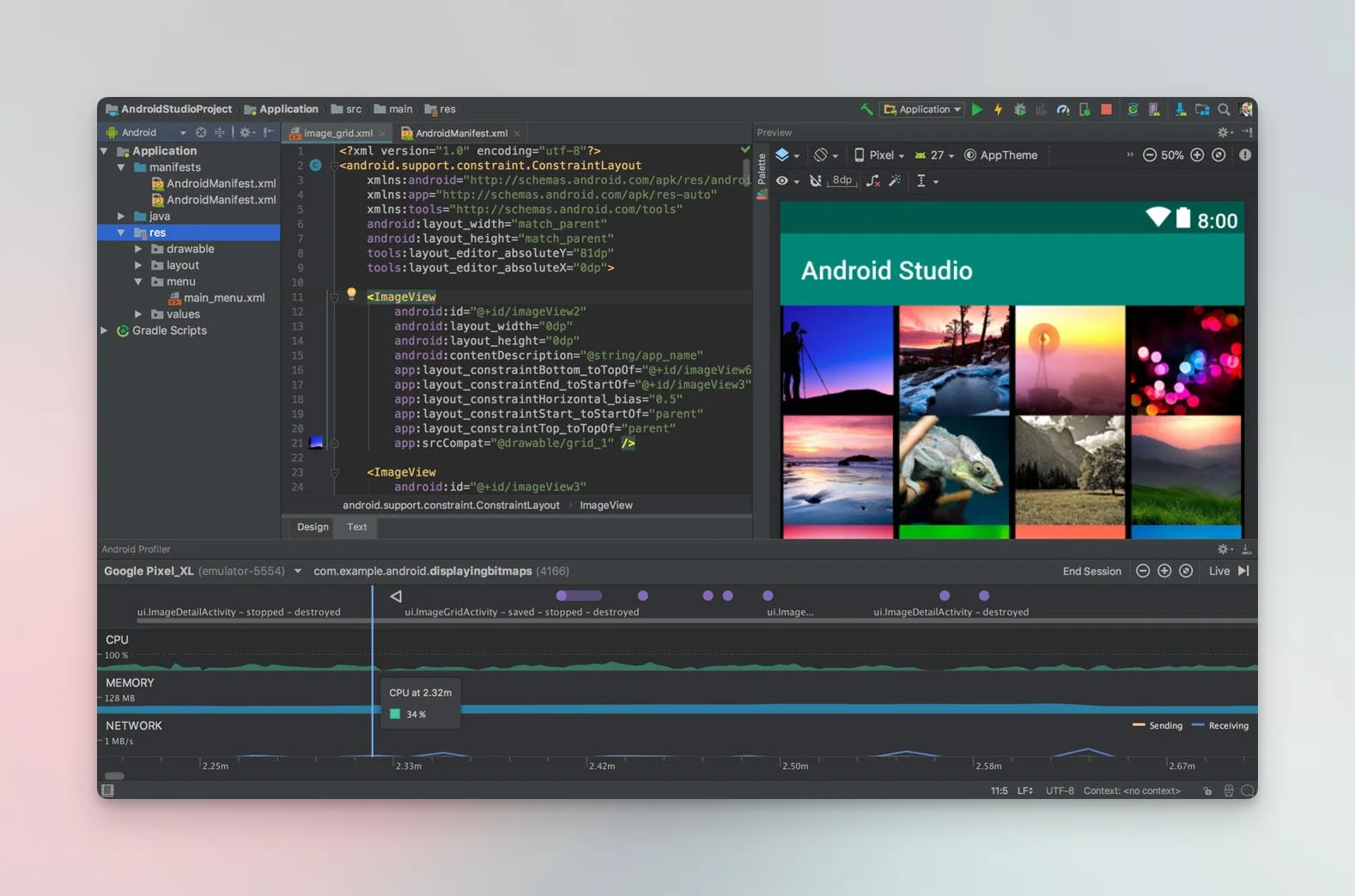
Android Studio is the official integrated Development Environment - IDE for Android app development. Developed and maintained by Google, it supports various features such as a visual layout editor, a code editor, a built-in emulator, integration with Google Cloud Platform, and support for a Gradle-based build system.
Notable Features Android Studio
- A code editor with code completion, refactoring, and debugging tools.
- A built-in emulator to test apps on different Android devices and configurations.
- A rich set of tools for performance profiling and analysis. A range of plugins to extend its functionality, like Firebase, Kotlin, and Flutter.
Android Studio Pricing Plans
It is free and open-source software based on the IntelliJ IDEA platform.
2. Android Debug Bridge
Android Debug Bridge - ADB is a command-line tool that allows developers to communicate with Android devices and emulators smoothly. It is included in the Android Software Development Kit (SDK) and performs various tasks, such as installing and debugging apps, transferring files, and managing the device's file system.
Notable Features of Android Debug Bridge
- Viewing logcat output for debugging and troubleshooting.
- Copying files from the host computer to the Android device.
- Getting a Unix shell on an Android device to run commands.
- Rebooting into Qualcomm Emergency Download (EDL) mode.
Android Debug Bridge Pricing Plans
Free to use.
3. Android Virtual Device (AVD)
Android Virtual Device (AVD) is an emulator that allows developers to test their Android apps on various virtual devices with different configurations. AVDs are managed and created through the Android Studio AVD Manager, which allows developers to test their apps on different versions of Android and a wide range of device specifications.
Notable Features of Android Virtual Device (AVD)
- AVDs can support hardware acceleration, which enables faster emulation and better performance.
- AVDs can be configured to emulate different types of Android devices, such as smartphones, tablets, and TVs.
- AVDs can be configured to run different versions of the Android operating system, allowing developers to test their apps on different API levels.
Android Virtual Device Pricing Plans
The Android SDK and its Android app development tools are available for free. But if you want to distribute your app through the Play Store, it charges a one-time fee of $25.
4. Firebase Tools
Firebase is an innovative and powerful set of Android app development tools for mobile app development teams. It provides various features like real-time data synchronization, authentication services, cloud storage solutions, and analytics. With Firebase, developers can quickly build applications with advanced features without spending time writing complex backend code.
Notable Features of Firebase Tools
- Interact with data stored in your Firebase database.
- Import and export users to and from Firebase Auth.
- Easily deploy code and assets to your Firebase projects.
- Firebase provides offline data support, so your app can continue to work offline.
Firebase Tools Pricing Plans
It has a Spark plan at no cost; if you choose the Blaze plan, you have to pay as you go.
5. Buddy
Buddy is cutting-edge software that lets you quickly and easily create any application from scratch. Its advanced CI/CD workflow capabilities can handle complex processes in just a few minutes and deploy in an average of 12 seconds. Its unique features, such as parallelism, intelligent change detection, all-around optimization, and state-of-the-art coaching, make it one of the fastest app-building software.
Notable Features of Buddy
- Improves the code quality of an existing codebase, known as code refactoring.
- Compatibility testing of an app or software on different platforms, devices, and browsers.
- Code-free development that allows users to build apps or software without writing any code.
Buddy Pricing Plans
- Free Plan: $0/month includes 1 seat, 1 runner, 300 pipeline GB-minutes.
- Pro Plan: $29/month includes 2 seats, 1 runner, 3000 pipeline GB-minutes.
Hyper Plan: $99/month includes 5 seats, 2 runners, 6000 pipeline GB-minutes, and advanced features.
6. Eclipse
Eclipse, a well-established Integrated Development Environment (IDE), is considered the best option for Java developers, providing an integrated environment for development and the ability to expose APIs as war files. A wide range of plugins is available, which makes it more convenient for businesses than other IDEs like NetBeans.
Notable Features of Eclipse
- Eclipse provides the ability to write in more than one programming language.
- Users can customize the interface and layout to their personal preference, including options for theme selection.
- Eclipse allows developers to manage individual software component files as a part of the greater overall project.
Eclipse Pricing Plans
It is open-source, making it entirely free.
7. Appy Pie
Appy Pie is a popular app development platform that has helped users create nearly 2 million apps since its launch in 2014. They include a free version with ads, the ability to implement services like Uber and Tinder clones, and support for unique features like CRM and Augmented Reality (AR).
Notable Features of Appy Pie
- Builder and support available in 10 languages.
- The "Custom Code" page can be added and customized by the user.
- Geofencing and local push notifications are supported in all paid plans.
- User-friendly interface, allowing for easy creation of basic apps in minutes.
Appy Pie Pricing Plans
- Basic: $16
- Gold: $36
- Platinum: $60
- Enterprise: Custom pricing
iOS Mobile App Development Tools
Creating iOS apps requires adept utilization of mobile app development tools to create innovative solutions. These tools cater to the unique demands of iOS development, facilitating seamless integration and efficient coding processes.
With these specialized mobile app developer tools, you can unlock the full potential of Apple's ecosystem. Here, we delve into the top iOS mobile app development tools to empower developers to create exceptional apps.
8. Xcode
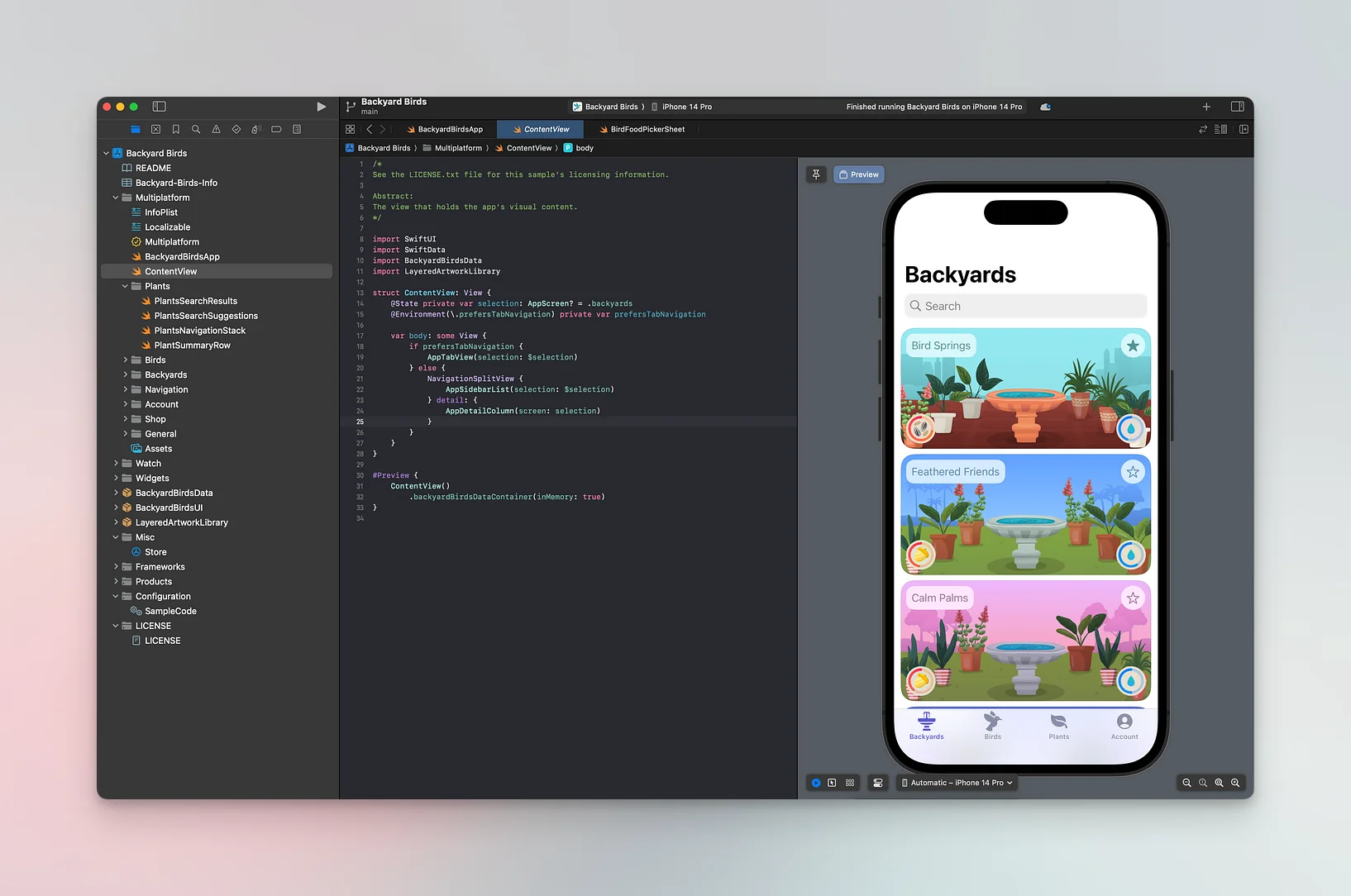
Xcode is a customized integrated development environment (IDE) developed by Apple for creating apps for iOS, iPad, macOS, watchOS, and tvOS. Developers without direct access to Apple hardware often rely on remote macOS environments to run Xcode and test their applications. It includes a code editor, user interface builder, debugging testing, and performance optimization tools.
Notable Features of Xcode
- Intelligent source code editing with your highlighting and code completion.
- Integrated debugging with launch options for iOS, watchOS, and OS X apps.
- UI design with customizable objects and storyboard for app flow and scene transitions.
Xcode Pricing Plans
Xcode is free to download, but app store deployment requires an annual Apple Developer Program membership at $99 and enterprise distribution at $299 per year.
9. X Developer Platform
X Developer Platform is a mobile development platform by Twitter that provides a suite of tools for building and managing mobile apps, including Crashlytics for crash reporting, Answers for analytics, and Beta by Crashlytics for distributing beta builds.
Notable Features of X Developer Platform
- Real-time crash reporting and identifying the root causes.
- Enables Beta by Crashlytics to distribute beta builds to testers.
- It can be integrated with other mobile development tools and platforms like Xcode and Android Studio.
X Developer Platform Pricing Plans
- Free: 1,500 monthly posts, 1 app ID. No cost.
- Basic: 3,000 users and 50,000 app monthly posts, 2 app IDs. $100/mo.
- Pro: 1M GET, 300K post monthly limits, 3 app IDs. $5,000/mo.
- Enterprise: Custom access, dedicated support. Apply for details.
10. Parse
Parse is another mobile app development platform that offers tools for creating and managing iOS mobile apps. It was initially developed by Parse Inc. and was later acquired by Facebook. After Facebook closed down the platform on January 28, 2017, the Parse open-source server is still being maintained by the community and can be self-hosted.
Notable Features of Parse
- SDK for iOS, Android, and JavaScript for easy integration.
- Web-based dashboard for app management and monitoring.
- Simple API for data storage and retrieval user authentication.
Parse Pricing Plans
Parse is free and open-source.
11. CodeRunner
CodeRunner is a code editor and development environment for macOS that allows developers to write, test and debug code in various programming languages. The platform is widely used for iOS development and includes a built-in terminal, making running and testing code easy without switching to a separate terminal window.
Notable Features of CodeRunner
- Supports multiple programming languages.
- Offers code completion, syntax highlighting, and automatic indentation.
- Includes a built-in file and project manager for easy organization and navigation.
CodeRunner Pricing Plans
CodeRunner is a paid software available for $19.99 and offers a free trial.
12. AppCode
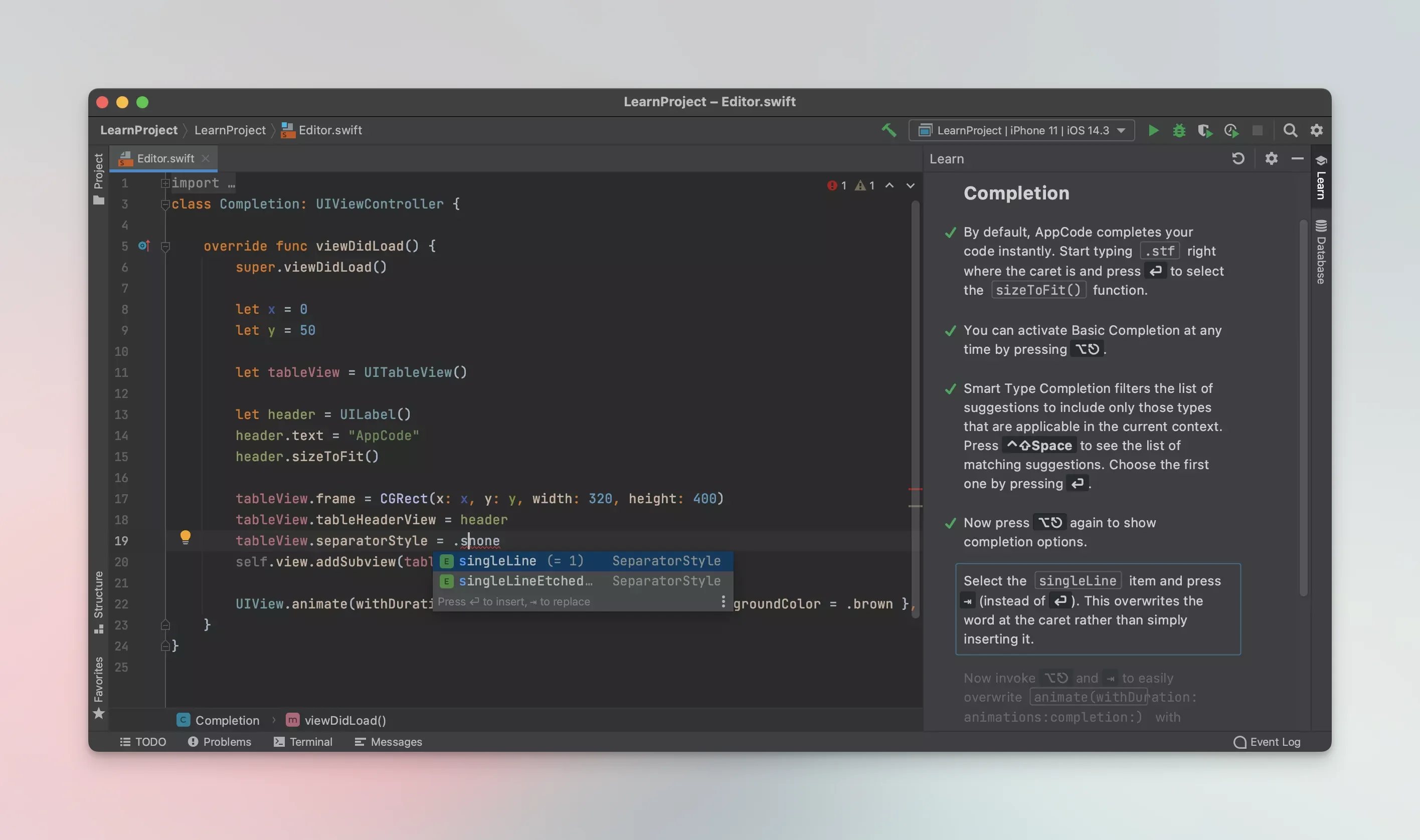
AppCode is a robust integrated development environment (IDE) created by JetBrains for iOS, macOS, and Android app development. It also supports multiple programming languages such as Swift, Objective-C, C, and C++ and provides a wide range of features that make coding faster and more efficient. AppCode is designed to work seamlessly with Xcode and Android Studio.
Notable Features of AppCode
- Detects and fixes errors and suggests code improvements.
- It can automatically refactor code for better readability and maintainability.
- Offers advanced code completion to reduce typing and improve efficiency.
AppCode Pricing Plans
- Businesses: $199 for the 1st year and $159 for the 2nd year.
- Individuals: $89 for the 1st year and $71 for the next year.
13. Jamf Pro
Jamf Pro is a mobile device management (MDM) solution for businesses and organizations that allows IT admins to manage and secure Apple devices, such as iPhones, iPads, and Macs. It allows admins to automate device management tasks such as device enrollment, software updates, and security settings.
Notable Features of Jamf Pro
- Keeps an inventory of devices with detailed information.
- Custom app management, including distribution, updates, and custom B2B apps.
- Provides security features such as password policies, encryption, and compliance.
Jamf Pro Pricing Plans
Starts at $3.67/month/device for iOS/iPadOS/tvOS and $7.89/month/device for macOS, with education and volume discounts available upon request.
Whether you are looking to develop an Android or iOS app, Aloa is the best company to hire mobile app developers. Their developers have a deep understanding of the latest technologies and industry trends, allowing them to deliver high-quality, innovative mobile apps.
Aloa’s commitment to ongoing training ensures that their app developers are always up-to-date with the latest Android and iOS mobile app development tools and techniques, while their project management skills ensure that projects are completed on time and within budget.
Cross-Platform Mobile App Development Frameworks
Cross-platform mobile app development frameworks are essential tools that streamline the process of building compatible applications across multiple platforms. These tools empower developers to write code once and deploy it on various operating systems, reducing time and effort in mobile app development.
Here's our selection of the top cross-platform mobile app development frameworks to optimize your development process and maximize efficiency.
14. React Native
React Native is an open-source framework developed by Facebook for creating mobile apps using JavaScript and React. The main advantage of React Native is that it allows developers to build mobile apps that can run on both iOS and Android platforms using the same codebase, thus saving time and resources.
Notable Features of React Native
- Used by major companies such as Meta and Airbnb.
- Developing iOS and Android with the same codebase.
- Uses native components, resulting in a higher performance.
React Native Pricing Plans
It’s an open-source framework, so it is free to use.
15. Flutter
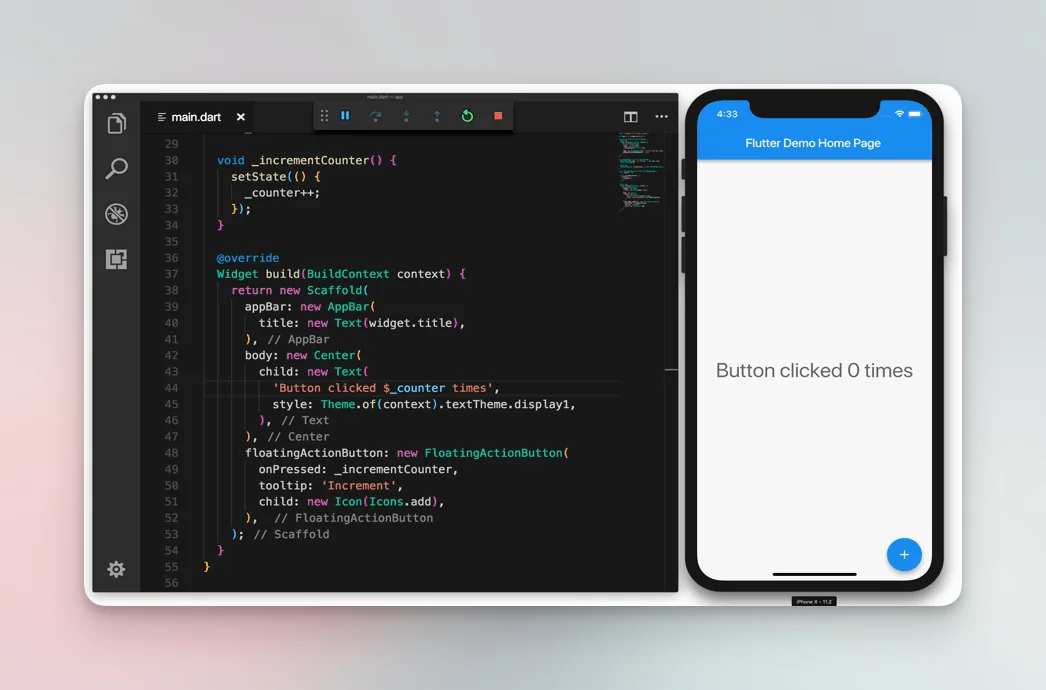
Flutter is a mobile application development framework created by Google. This cross-platform is used to create and develop Android, iOS, Linux, Mac, and windows applications. Flutter uses the Dart programming language and features a reactive programming model, which allows for the creation of high-performance, responsive user interfaces.
Notable Features of Flutter
- Supports both iOS and Android.
- Offers fast developments with a “hot reload” feature.
- Provides customizable and expressive UI with widgets.
Flutter Pricing Plans
Flutter is free, but you may need to pay for other costs, such as app store fees and third-party packages.
16. Xamarin
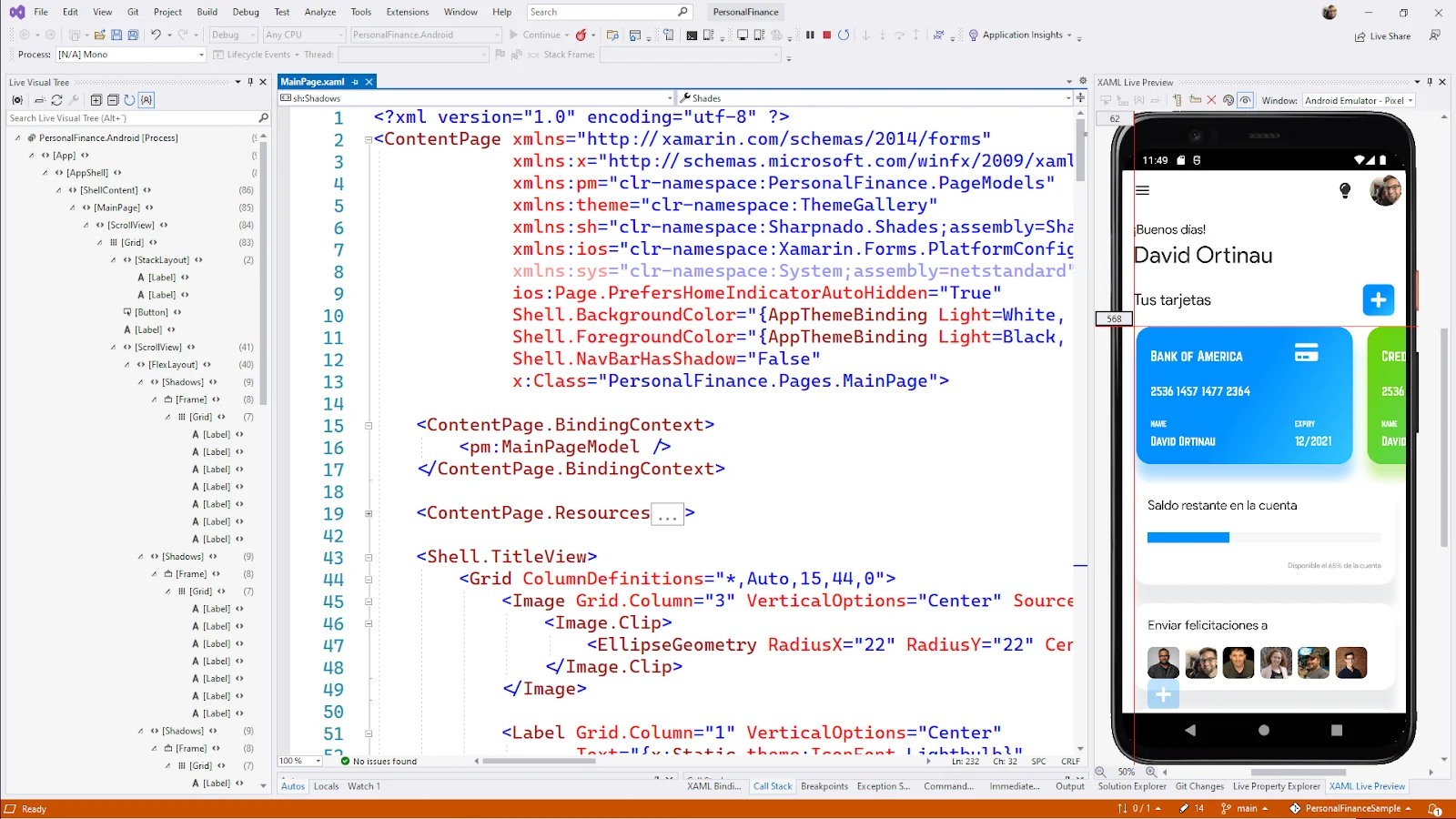
Xamarin is a cross-platform app development framework created by Microsoft. It allows .NET developers to use C# and the .NET framework to create native Android, iOS, and Windows applications. Like Flutter, Xamarin uses a single codebase to develop multiple platforms, saving time and effort compared to building separate apps for each platform using native languages.
Notable Features of Xamarin
- Allows for building mobile apps using C# and .NET framework.
- It uses native UI, resulting in more performance-efficient apps.
- It has a large community and a fast selection of available libraries.
Xamarin Pricing Plans
Xamarin is also a free and an open-source tool.
17. Ionic
Ionic is another popular open-source framework for building cross-platform mobile apps. It allows developers to use web technologies such as HTML, CSS, and JavaScript to create apps that run on iOS, Android, and the web. Ionic provides a library of pre-built UI components and a command-line interface (CLI) for creating and building apps. For businesses aiming to optimize cross-platform development, hiring Ionic developers can bring specialized skills to fully leverage this powerful framework.
Notable Features of Ionic
- Has a large collection of pre-built UI components and plugins.
- Has a very large community and a vast selection of libraries as well.
- It allows developers to use the same codebase for multiple platforms.
Ionic Pricing Plans
- Standard plan: $2499/month
- Enterprise plan: Customized pricing
- Superapp SDK: Customized pricing
18. NativeScript
NativeScript allows developers to use JavaScript, Angular, Vue.js, or TypeScript to create apps that run on iOS and Android. Like Ionic, NativeScript also allows developers to use a single codebase for multiple platforms. It uses the native APIs of the platforms to create truly native mobile apps, which makes the apps perform better and have a better look and feel.
Notable Features of NativeScript
- Allows developers to create visually stunning and polished applications than others.
- Can access native device functions and APIs using JavaScript code with the help of Cordova Plugins.
- The Ionic Command Line Interface provides helpful commands for starting building, running, and emulating ionic apps.
NativeScript Pricing Plans
NativeScript is a free and open-source platform.
19. Adobe PhoneGap
Adobe PhoneGap (formerly known as Apache Cordova) is a free and open-source framework that allows developers to use web technologies to create apps that run on iOS, Android, and other platforms. PhoneGap uses a technique called “Wrapping” to package the web app into a native app, which allows the app to access native device features such as the camera and GPS.
Notable Features of Adobe PhoneGap
- PhoneGap uses common browser-based skills; no additional inputs are needed.
- PhoneGap backend system speeds up development and reduces developer effort.
- It’s a win-win solution for developers and businesses, allowing for fast app development and market release.
Adobe PhoneGap Pricing Plans
Adobe PhoneGap is open-source and free to use.
20. Sencha Touch
Sencha Touch is a JavaScript framework that utilizes HTML5 to create high-performance apps for various mobile platforms such as iOS, Android, and Windows. It offers over 50 built-in components, customizable themes, and an MVC system to simplify the development process.
Notable Features of Sencha Touch
- Includes adaptive layouts, animations, and smooth scrolling for a better UX.
- Flexible layout manager for data and content display on multiple mobile devices.
- Offers customizable UI widgets with over 50 built-in options for mobile platforms.
Sencha Touch Pricing Plans
- Community Edition: Free to use
- Enterprise: $1895
- Pro: $1295
21. Titanium SDK
Titanium SDK is based on the popular Apache Cordova (PhoneGap) framework and uses hyperloop technology to give developers direct access to the underlying native APIs. With this technology, developers can write JavaScript that maps directly to the native APIs, providing better performance and a close-to-native experience.
Notable Features of Titanium SDK
- Allows navigation bars, menus, dialog boxes, and other native UI elements.
- Offers special support for iPad-specific features such as split views and popovers.
- Developers can use popular cross-platform mobile app development frameworks like Angular, Vue.js, TypeScript, React, etc.
Titanium SDK Pricing Plans
Its open-source framework makes Titanium SDK free of cost.
Key Takeaway
Choosing the right mobile app tools is essential for maximizing productivity, whether you're designing an app, managing client projects, or handling document conversions. Having a tool that can convert PDF to PPT allows businesses to quickly repurpose reports, presentations, and proposals for different stakeholders. By selecting the best mobile solutions, teams can streamline workflows, improve efficiency, and enhance collaboration on the go.
Selecting the right mobile app development tools offers a pathway to creating impactful and efficient mobile applications. Many mobile app developer tools exist, from free resources for beginners to advanced, paid options. These tools provide frameworks, platforms, and environments to streamline development. The benefits of selecting the optimal tools include enhanced productivity, improved app performance, and a smoother development experience.
Developers should thoroughly research and experiment with various mobile app developer tools to find the ones that best fit their project's needs. Factors to consider include the tool's compatibility with your project's goals, the learning curve, community support, and integration capabilities. Choosing the right mobile app development tools can significantly affect the success and efficiency of your development process.
Sign up for Aloa's email list to stay updated on the latest trends and tools in mobile app development. We'll provide expert advice, tool reviews, and industry insights to ensure your mobile app development project succeeds. So, hire a web developer today or contact us at resources@aloa.co to take the first step toward building your next mobile app in 2024!

